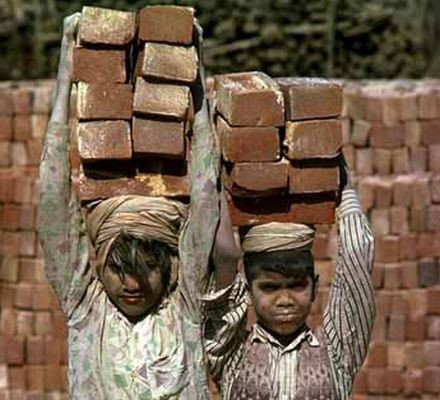Blood Bricks: Ending Modern Day Slavery

Oscar fever is reaching its highest pitch with the modern day masterpiece 12 Years a Slave, set during the 1840s, many peoples' tip to win best film. Yet the abominable issue of slavery is not a past-tense problem; it is very much in our midst today.
According to the ILO almost 21 million people are victims of forced labour – 11.4 million women and girls and 9.5 million men and boys. And the brick production industry, centring on India, is an epicentre of abuse.
Workers are forced to produce over 1,500 bricks every day, they are paid in advance and only able to leave after a minimum of six months while, children also suffer from severe respiratory problems. Only recently workers' hands were cut off by contractors in the eastern state of Odisha, simply because they wanted to leave.
Meanwhile the Andhra Pradesh government has ordered an inquiry after it was reported that children were working alongside adult labourers at a brick kiln near Hyderabad. The State Labour Commissioner ordered the inquiry after it was discovered that the kiln owner had no license to operate, and had not registered with the Labour Department.
Average wages are just two to three dollars per day, and many families don't have enough to eat
This lack of a licence is not irregular, nor uncommon. In fact it is one of many facets of malpractice which have coalesced into a morass of misery for hundreds of thousands of human beings in the brick kilns; the industry employs up to 10 million workers, and yet its practices would shame the most ramshackle of family firms.
Abysmal pay
The root cause of the brick kiln bondage lies in low wage rates. While wages are low across the unorganised sector in India these are abysmally low in the brick kiln sector. Analysis of records across three states shows that average wages over the working period of six months range between two to three US dollars per day. These rates are significantly lower than statutory minimum wages.
Simply to earn this level of wages, workers have to put in twelve or more hours of work every day. Children are forced to work as the food expenses given to workers are correlated to production levels. Lower production can simply mean that a family does not have enough to eat.
Due to the nature of bonded labour, workers and their families are frightened for their physical safety and sadly remain in the brick kilns rather than approaching the authorities to intervene - which of course would result in the full scale of the problem being officially acknowledged.
Time for action
Union Solidarity International has partnered with Prayas, Action Aid Association, War on Want and Thompsons Solicitors (Scotland) to launch an international campaign to highlight forced, bonded and child labour in India's brick kilns of India.
The 'Blood Bricks' campaign focuses on organising, educating and mobilising hundreds of thousands of workers to raise wages, access public services, and combat child labour and sexual exploitation.
The campaign is designed to apply pressure on the ground in India but also use levers in the UK. A document entitled 'Good Business: Implementing the UN Guiding Principles on Business and Human Rights' makes clear the UK Government's commitment to protect human rights and sets out the clear expectations for companies.
'Good Business' builds on recent changes to the Companies Act (2006) with new regulations coming into force on 1 October 2013, requiring companies to report non-financial information including disclosures on human rights where such information is necessary for an understanding of the business.
In certain circumstances the law allows workers based in foreign countries to bring claims in the UK against UK companies. This means that companies who have off-shore activities which are housed in buildings built through bonded labour conditions could be sued for damages in the UK by Indian workers.
Companies cannot, through wilful blindness, continue to ignore where the bricks are being sourced from to fuel their expansion. Not only is there a moral obligation to take responsibility for their supply chains but a legal one. We will be working with our partners in the Blood Bricks campaign to ensure companies fulfil these legal obligations and where they do not we will take action.
The modern day slavery in India's brick kilns is no longer a secret around the world and it will be exposed for the stain on humanity for which it is.
Andrew Brady is director of Union Solidarity International, a pan-national body which exists to further the cause of trade unions and oppose neoliberalism.
For more information about USi, go to the website or follow on Twitter here.
© Copyright IBTimes 2025. All rights reserved.





















